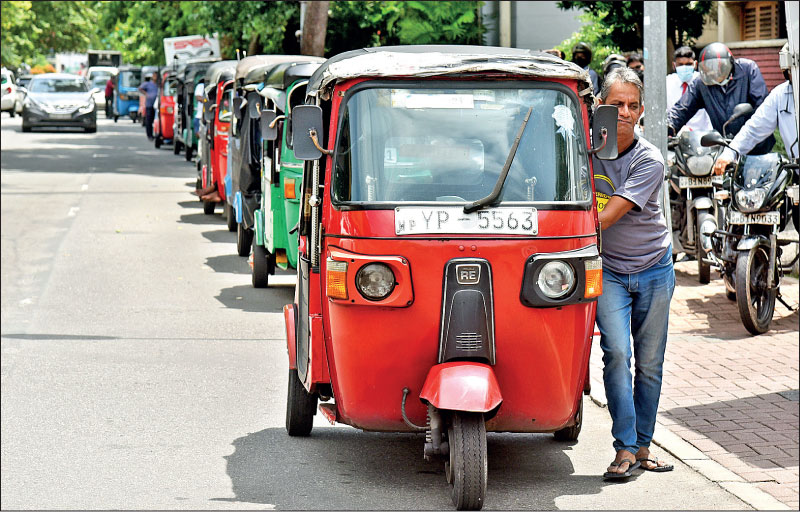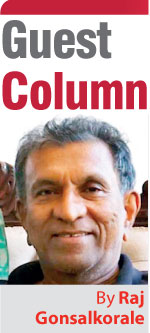Saturday Feb 07, 2026
Saturday Feb 07, 2026
Friday, 10 June 2022 00:01 - - {{hitsCtrl.values.hits}}

There is still no definitive path and a plan towards some degree of economic stability
“I am a firm believer in the people. If given the truth, they can be depended upon to meet any national crisis. The great point is to bring them the real facts.”
– Abraham Lincoln, 16th President of the United States –
 The Prime Minister has been as frank as he could be about the crisis in Sri Lanka. Neither he, as a previous Prime Minister, nor any other Prime Minister or a President, including the current President, provided the unvarnished truth about the crisis to the people of the country till now. Prior to his assuming the Prime Ministership, other government leaders have given a false impression of normalcy and talking and behaving as if things were normal. The general thrust has been to direct blame for the political instability towards protestors, although it is no secret that some opportunists have ridden on the backs of genuine protestors to advance their own agendas with no regard for the plight faced by the country.
The Prime Minister has been as frank as he could be about the crisis in Sri Lanka. Neither he, as a previous Prime Minister, nor any other Prime Minister or a President, including the current President, provided the unvarnished truth about the crisis to the people of the country till now. Prior to his assuming the Prime Ministership, other government leaders have given a false impression of normalcy and talking and behaving as if things were normal. The general thrust has been to direct blame for the political instability towards protestors, although it is no secret that some opportunists have ridden on the backs of genuine protestors to advance their own agendas with no regard for the plight faced by the country.
As evident from news reports, there is still no definitive path and a plan towards some degree of economic stability. There are ad hoc news reports about discussions with friendly governments, ongoing Indian assistance, medicines being sent by some governments, Tamil Nadu providing some support, and now, Bangladesh planning to send potatoes.
It is true that an IMF bailout package could be a reality, although timelines for this, conditions attached to such a bailout and what exactly the package would include is not yet known. Besides this, even if such a package becomes a reality, it would not be a sufficient bail out that will lead the country towards that yet to be seen silver lining.
The need of the hour is an emergency economic bailout plan identifying countries that have been contacted, and will be contacted for support, the form of support discussed and expected, (money or supplies), countries that have been and should be contacted for oil and gas say for the next six months, whether such support could be provided as long-term credit lines, a plan for supply of medicines from pharmaceutical producing countries like India and Bangladesh, fertiliser supplies, and essential food items.
No doubt some of these activities have commenced and are ongoing, but the public still has no indication of the progress of such approaches except piecemeal information reported in the press. As the Prime Minister is the person in charge of trying to lift the economic downfall and find ways and means of securing loans/credit lines from different sources, he and his office could produce a plan with ongoing and intended activities, and progress being made and information on specific successes. Such an approach will give confidence to the public and lift their hopes for the immediate future.
The Prime Minister has given a dismal warning about the immediate future and that worse is yet to come. How many have taken notice of this dire warning is unclear. Neither the President nor politicians in Parliament have referred to the Prime Minister’s warning. This could even be a plan to undermine the efforts of the Prime Minister.
Be that as it may, the warning given should be followed with a specific rescue plan, identifying the action items mentioned above and any other additional items related to a rescue plan, and daily progress reports relating to the plan.
What of the Prime Minister’s assessment that days, weeks and months ahead will be worse than what it is now? Energy and transport costs are on the rise, thanks to the aftermath of COVID and the war in Ukraine. Shipping circles have said that freight costs, which have gone up by some 50%, will increase further. Oil and gas prices will rise further. It would not be rocket science to predict the fall out arising from this and the impact on Sri Lanka. Shortages of fuel, gas, medicines, and food items will worsen, and countries that have assisted Sri Lanka, like India and China, will feel the pinch themselves, and they may find it difficult to extend the same level of assistance to Sri Lanka.
What will be the aftermath of such a situation? More power cuts, further folding of industries, large and small? More firewood cooking although firewood is fast becoming as scarce as gas. Reduction in export earnings, foreign remittances, tourism earnings, all leading to mass unemployment, possible unrest, even violence. Queues for passports stretch for kilometres. Would there be a mass exodus from Sri Lanka legally or otherwise?
Sri Lanka’s food security has been adversely affected on account of the fertiliser saga, and it has been reported that the country may need to import more than 200,000 tons of rice. The question will be how such an import is going to be paid, if it is not covered by a credit line extended to Sri Lanka. The President’s regular issue of “instructions” to officials, as reported in the press will not address the issue of food security. He should appoint a committee that should be chaired by him, to develop a plan that will address the issue of food security and take specific actions to implement the plan and report on the progress being made to the public. He must take responsibility to address an issue that he created.
As part of the rescue plan, the Prime Minister could request high level envoys like former President Chandrika Kumaratunga and former Speaker Karu Jayasuriya, who still have credibility, to meet Heads of State in China, India, Japan, Russia, the USA, Bangladesh, Saudi Arabia and other Middle Eastern countries, to canvass for assistance to Sri Lanka. Doing this through the Ambassadors and High Commissioners of these countries based in Sri Lanka is not high-level diplomacy. It needs to be noted that neither the President nor the former Prime Minister Mahinda Rajapaksa visited any of these countries except India to seek assistance even when the dark economic clouds were very clearly visible in the sky at least 18 months ago. It was either arrogance or stupidity, or both as stupidity leads to arrogance.
In the dire situation the country is placed in, politicians are debating the 21st Amendment. There is no denial that the Executive Presidency has failed the country and that governance should return to the Parliament. However, the question is about priorities. Politicians must surely know that Sri Lanka as the people have known it, may not exist if the situation foreseen by the Prime Minister comes to pass. While every Sri Lankan would hope and pray it will not come to that, it will not be divine help that will take Sri Lanka out of the mess it is in. It is the down to earth focus and a collective effort on the part of every Sri Lankan as to how some oxygen can be pumped into a dying and gasping country.